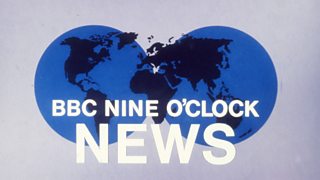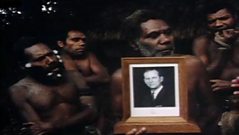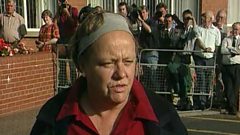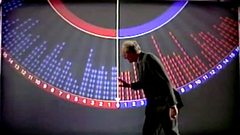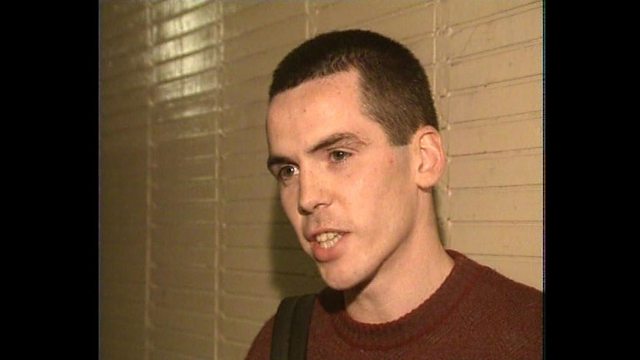
Maguire Seven convictions cannot stand
The Home Secretary David Waddington says the convictions against the Maguire Seven for running a PIRA bomb factory cannot stand. He intends to refer their case to the Court of Appeal.
The clip begins with newsreader Michael Buerk announcing that the Home Secretary David Waddington has said the convictions against the Maguire Seven for running a Provisional Irish Republican Army (PIRA) bomb factory cannot be allowed to stand.
Mr. Waddington’s declaration comes after the Director of Public Prosecutions deemed the convictions unsafe and unsatisfactory.
Mr. Waddington would probably refer the case back to the Court of Appeal – but not until Sir John May’s judicial inquiry had been completed.
Joshua Rozenberg’s report begins with film of Sir John May and his colleagues; they are pictured almost one month into the inquiry hearings.
Sir John May commissioned a leading analytical chemist (Professor Thorburn Burns, pictured in May Inquiry amateur video) to check the scientific tests used to convict the Maguire family of handling explosives. Professor Burns found that people could have traces of nitro-glycerine on their hands quite innocently.
As a result the Director of Public Prosecutions, Allan Green QC, announced today that the jury may have been misled by the scientific evidence at the original trail.
Home Secretary David Waddington states in the House of Commons that the Maguires should be cleared and that he would refer their case to the Court of Appeal.
Anne and Patrick Maguire (her son) are pictured at Sir John May’s public inquiry.
Patrick states, “I haven’t been waiting 16 years for anyone to tell me that I’m innocent – I know that. What I have been waiting for is why I’ve had to suffer for sixteen years in my own country, as a Londoner.” Anne is hopeful that their names will be cleared.
In the House of Commons Roy Hattersley calls for an inquiry into the conviction of the Birmingham Six (jailed for the Birmingham pub bombings which took place on 21 November 1974).
The report concludes with footage of two members of the Birmingham Six in prison. Joshua Rozenberg informs us that the Irish Government would pursue its efforts on their case with the utmost vigour and priority and Dublin welcomed the DPP’s announcement on the Maguire case.
CONTEXT
On 5 October 1974 the Provisional Irish Republican Army (PIRA) targeted Guildford, Surrey, because it was situated close to a number of garrison towns. The PIRA planted two six-pound gelignite bombs in two pubs. The first exploded just before 9.00pm in the Horse and Groom, destroying the front of the building and shattering the windows of neighbouring shops.
It killed Paul Craig, a plasterer (22 years old); two members of the Scots Guards, William Forsyth (18) and John Hunter (17); and two members of the Women’s Royal Army Corps, Caroline Jean Slater (18) and Ann Ray Hamilton (19). A further sixty-five persons were wounded.
After the first explosion, other public houses were evacuated, including the Seven Stars where the second bomb exploded at approximately 9.35 p.m. without causing any serious injuries.
On November 7 1974 Gunner Richard Dunne, a soldier (42) and Alan Horsley, a sales clerk (20) were killed when a PIRA bomb exploded in the King’s Arms in Woolwich. Twenty-six people, including five soldiers, were injured.
In December 1974 the police arrested three men and a woman: Gerry Conlon, Paul Hill, Patrick Armstrong and Carole Richardson. In October 1975 these four were convicted of the Guildford and Woolwich bombings and given life sentences. The group was known as the Guildford Four.
On 4 March 1976 the Maguire Seven were convicted of making the explosives used in these bombings. The Maguire Seven were: - Anne Maguire, Patrick Maguire (Anne’s husband), Patrick Maguire (son of Anne and Patrick), Vincent Maguire (son of Anne and Patrick), Sean Smyth (brother of Anne), Patrick O’Neill (family friend) and Giuseppe Conlon (brother-in-law of Anne Maguire and father of Gerry Conlon).
Over the years, the cases of the Guildford Four and the Maguire Seven came under increasing legal scrutiny and the range of those seeking a review of the convictions extended widely. On 17 October 1989 it was announced that corruption proceedings would be taken against the police involved in the conviction of the Guildford Four. Two days later, with the exception of Paul Hill, those convicted for the bombings were released. This followed an announcement by the Director of Public Prosecutions that it would be wrong for the Crown ‘to seek to sustain’ the convictions of 1975 on the basis of confessions that they had later retracted. The Court of Appeal had decided that the DPP in 1975 had suppressed scientific evidence which conflicted with the confessions. Paul Hill remained in custody because he was implicated in a case that had not yet been resolved. His conviction was eventually quashed in April 1994.
On 26 June 1991 the Court of Appeal overturned the sentences on the Maguire Seven. All of them had completed their sentences. Afterwards many criticised the court for dismissing most of the grounds of appeal and had simply concluded that the hands of the convicted could have been innocently contaminated with nitro-glycerine.
Duration:
This clip is from
More clips from �鶹������ҳ��� Nine O'Clock News
-
![]()
Worshipped in Vanuatu—24/06/1980
Duration: 01:02
-
![]()
Real IRA statement on Omagh bomb—18/08/1998
Duration: 02:39
-
![]()
Van Gogh Painting Auctioned for Record £25 million—30/03/1987
Duration: 02:41
-
![]()
Analysis of the 1997 Election—02/05/1997
Duration: 02:45
